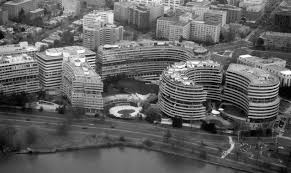By Mark Gruenberg
WASHINGTON: Among all the court cases, scandals, and constitutional crises swirling around convicted felon Donald Trump, the criminal Republican ex-president and now—again—the party’s presidential nominee, let us pause to remember another big constitutional crisis the U.S. faced—Watergate.
August 8, 2024, marks the 50th anniversary of the culmination of that two-year saga, in 1974. It was the night another Republican president, Richard Nixon, who had famously proclaimed “I am not a crook” and another time declared “quitters never win,” announced he would resign the next day.
Had Nixon not quit, he would have been overwhelmingly impeached by the House and convicted by the Senate, by bipartisan votes, for his constitutional crimes all wrapped up in that one word. Obstruction of justice. Abuse of power. Though it was not a formal charge, election subversion. The formal charge was defiance of congressional subpoenas issued to get to the bottom of the case. After all, the Watergate grand jury of regular citizens had named Nixon an “unindicted co-conspirator” in the panoply of constitutional crimes encompassed in the word “Watergate.”
The crimes included trading hidden corporate campaign contributions for favors, White House-ordered burglaries in D.C. and Los Angeles, payment of hush money to the burglars to shut them up, subverting the election by deliberate lies and wrecking foes’ campaigns, and an “enemies list” ranging from Barbara Streisand to United Auto Workers President Leonard Woodcock. One Nixon aide, Charles Colson, advocated arson against a progressive think tank. There was much much more.
In the end, Nixon’s tapes did him in. His fellow Republicans deserted in droves after the famous “smoking gun” White House tape was released. It showed Nixon ordered the cover-up of the Watergate burglary, with “national security” as a fabricated excuse, six days after the burglars were caught. The cover-up continued, until newspapers, Congress, and the courts revealed it and until key figures below Nixon, notably John Dean, sang to prosecutors. The tapes backed them up.
The Senate and House Republican leaders, Hugh Scott of Pennsylvania and John J. Rhodes of Arizona, plus the party’s unflinchingly honest, unflinchingly straight-talking, and unflinchingly conservative Sen. Barry Goldwater of Arizona, came to give Nixon the word. Goldwater reportedly delivered the coup de grace. “You have fewer than 10 votes in the Senate” of the 34 Nixon needed to escape conviction. “And I’m not one of them.”
There were still a few Nixon diehards, despite the Mount Everest of evidence that he subverted the Constitution and broke the law. “Don’t confuse me with the facts. My mind is made up,” said Rep. Earl Landgrebe, R-Ind. Landgrebe, like droves of Republicans, lost his seat that November. “Our long national nightmare is over,” said Nixon’s appointed vice president, Gerald R. Ford, on assuming the Oval Office the day after Nixon’s announcement. Except it wasn’t.
Ford pardoned Nixon a month later, and Ford and the Republicans caught electoral hell. Ford was VP only because Nixon’s original vice president, Spiro Agnew, resigned the previous November in a nolo contendere plea-bargain deal for taking bribes as Maryland governor and as vice president.
Otherwise, Agnew would have gone to jail. And had Ford not pardoned Nixon, the deputy special prosecutors—but not Watergate Special Prosecutor Leon Jaworski—wanted the grand jury to indict Nixon. Trials and convictions of Nixon’s co-conspirators, his top staffers, followed in 1975.
The key point in all of this is Nixon believed he could get away with it, not just with Watergate and not just with obstruction of justice, but with everything. “If the president does it, that means it’s not illegal,” he told TV interviewer David Frost several years later.
This writer has been a D.C. reporter, and son of a D.C. reporter, long enough to have covered Watergate, as editor of his university’s student newspaper. His bachelor’s thesis discussed Watergate and other battles between Nixon and the press. His father covered Watergate for the late Chicago Daily News. For your editor, Watergate is not ancient history.
It is also not a garden-variety political scandal. Those are tradeoffs for campaign checks or bags of cash, or being paid off in gold bars by foreign countries, or distributing railroad stock to congressional cronies in sweetheart deals, or selling U.S. oil land at giveaway prices to magnate Harry Sinclair.
Watergate was a constitutional crisis, an attack on and subversion of the very system of government and elections itself. It was the worst attack on the Constitution since the Civil War…then.
Which is our final point in this column. At one Watergate hearing in 1974, this writer sat next to a distinguished veteran reporter and columnist who told him: “This is worse than Teapot Dome…and I covered Teapot Dome.” The Teapot Dome scandal, benefitting Sinclair, occurred a century ago. Now I say, January 6 is worse, much worse, than Watergate…and I covered Watergate.” (IPA


